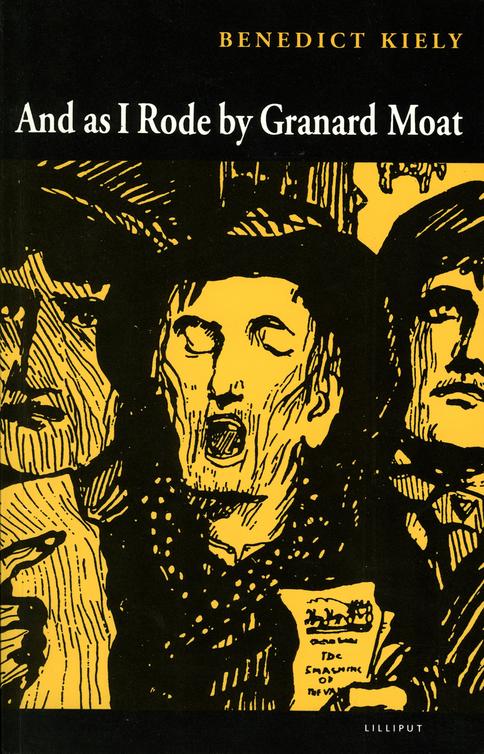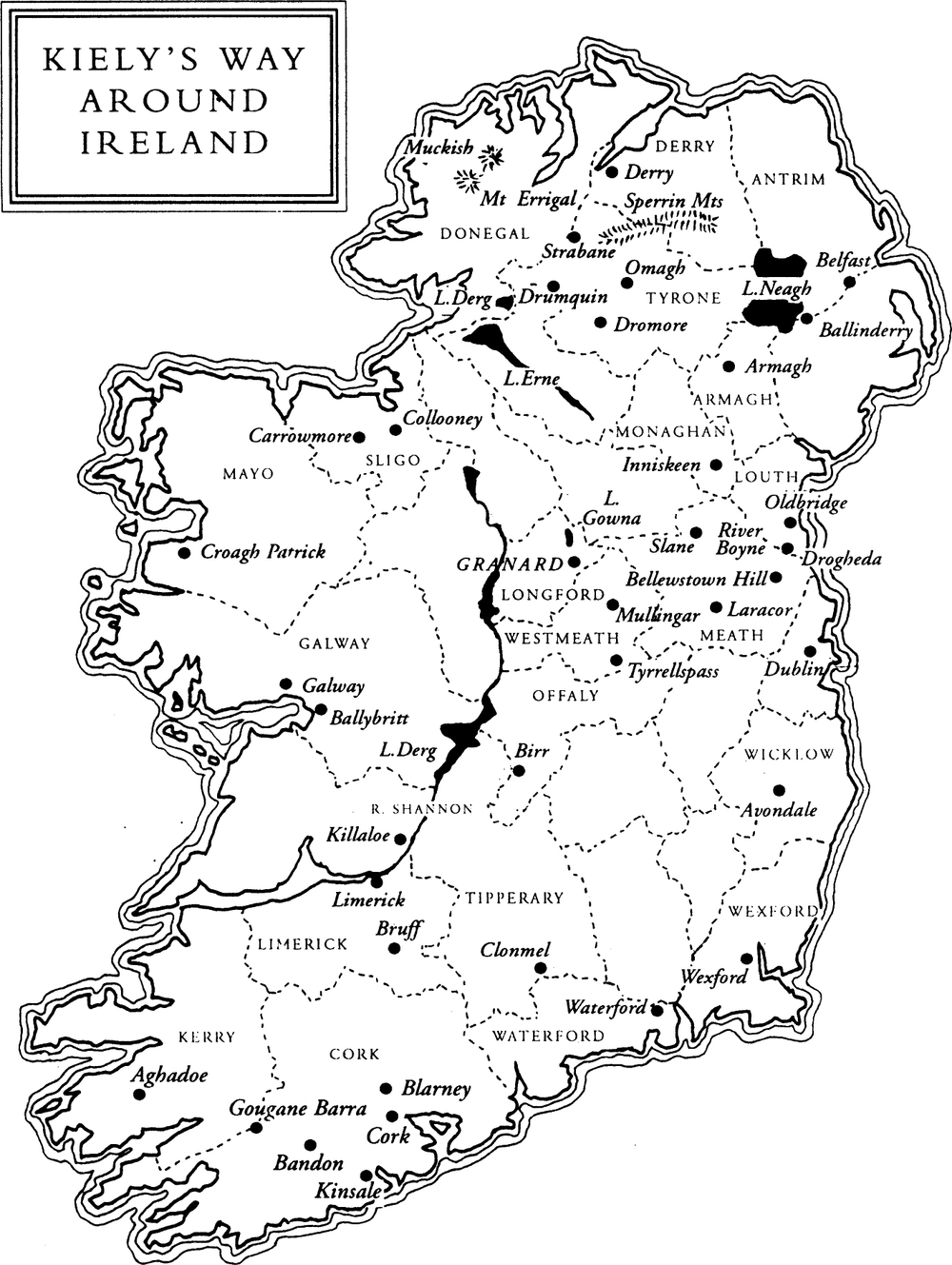As I Rode by Granard Moat
Read As I Rode by Granard Moat Online
Authors: Benedict Kiely

For Ciarán MacMathúna
who owns the world that I wandered through
Benedict Kiely
THE LILLIPUT PRESS
DUBLIN
‘The Green Flowery Banks’ [Anon.]
‘The Ballad of Douglas Bridge’ [Francis Carlin]
‘Me an’ Me Da’ [Rev. Marshall]
‘When I Was a Little Girl’ [Alice Milligan]
‘The Ould Orange Flute’ [Anon.]
‘The Hills above Drumquin’ [Felix Kearney]
‘The Man from God Knows Where’ [Florence Wilson]
‘Lament for Thomas Davis’ [Samuel Ferguson]
‘’
Tis Pretty tae be in Baile-liosan’ [Joseph Campbell]
‘The Treacherous Waves of Loughmuck’ [Frank McCrory]
‘Song of the Little Villages’ [James Dollard]
‘The Winding Banks of Erne’ [William Allingham]
‘The Lough Derg Pilgrim’ [Seamus Heaney]
‘Like Dolmens Round My Childhood, the Old People’ [John Montague]
‘A Lost Tradition’ [John Montague]
‘The Maid of Lough Gowna Shore’ [Anon.]
‘Nell Flaherty’s Drake’ [Percy French]
‘O’Hussey’s Ode to the Maguire’ [James Clarence Mangan]
‘The Wake of William Orr’ [William Drennan]
The Maiden City’ [Charlotte Elizabeth]
‘Aodh Ruadh Ó Domhnaill’ [Thomas MacGreevy]
‘The Forsaken Soldier’ [Hudie Devaney, tr. Paddy Tunney]
‘A Christmas Childhood’ [Patrick Kavanagh]
‘The Lions of the Hill Are Gone’ [Samuel Ferguson]
‘I Am the Mountainy Singer’ [Joseph Campbell]
‘Ballad to a Traditional Refrain’ [Maurice Craig]
‘The Boys of Mullaghbawn’ [Anon.]
‘Wild Slieve Gallen Brae’ [David Hammond]
‘Train to Dublin’ [Louis MacNeice]
‘The Humours of Donnybrook Fair’ [Anon.]
‘Dublin Made Me’ [Donagh MacDonagh]
‘Down by the Liffey Side’ [Donagh MacDonagh]
‘Autumn Afternoon’ [Roibeard Ó Faracháin]
‘Dublin’s Children’ [Padraic Gregory]
‘The Hill of Killenarden’ [Charles Halpine]
‘She Walked Unaware’ [Patrick MacDonogh]
‘Mary Hynes’ [Padraic Fallon, after Raftery]
‘The Western World’ [Robert Farren]
‘Spraying the Potatoes’ [Patrick Kavanagh]
‘Spring Stops Me Suddenly’ [Valentin Iremonger]
‘A Racehorse at the Curragh’ [Francis Stuart]
‘My Love Is like the Sun’ [Anon.]
‘Bellewstown Hill’ [John Costello]
‘The Night before Larry was Stretched’ [attd to Rev. Robt Burrowes]
‘The Boyne Walk’ [F.R. Higgins]
‘On Seeing Swift in Laracor’ [Brinsley MacNamara]
‘Going to Mass Last Sunday’ [Donagh MacDonagh]
‘The Yellow Bittern’ [C.B. Mac Giolla Gunna, tr. Thomas MacDonagh]
‘Padraic O’Conaire – Gaelic Storyteller’ [F. R. Higgins]
‘Georgian Dublin’ [Maurice Craig]
‘An Elegy on the Death of a Mad Dog’ [Oliver Goldsmith]
‘Twenty Golden Years Ago’ [James Clarence Mangan]
‘The Time of the Barmecides’ [James Clarence Mangan]
‘The Woman of Three Cows’ [Anon., tr. James Clarence Mangan]
‘Gone in the Wind’ [James Clarence Mangan]
‘King Brian before the Battle’ [William Kennelly]
‘Lament for Dædalus’ [John Sterling]
‘Leda and the Swan’ [Oliver St John Gogarty]
‘Canal Bank Walk’ [Patrick Kavanagh]
‘Lines Written on a Seat on the Grand Canal’ [Patrick Kavanagh]
‘The Blackbird of Derrycairn’ [Austin Clarke]
‘A Prayer for My Daughter’ [W.B. Yeats]
‘The Spanish Lady’ [Joseph Campbell]
‘The Old Road Home’ [Teresa Brayton]
‘The Lost Ones’ [Francis Ledwidge]
‘My Mother’ [Francis Ledwidge]
‘Old Woman of the Roads’ [Padraic Colum]
‘The King of Ireland’s Son’ [Nora Hopper]
‘A Day in Ireland’ [Anon., tr. Michael Cavanagh]
‘The County of Mayo [Thomas Lavelle, tr. George Fox]
‘A Vision of Connacht in the Thirteenth Century’ [James Clarence Mangan]
‘Ringleted Youth of My Love’ [Anon., tr. Douglas Hyde]
‘In a Foreign Land’ [Douglas Hyde]
‘The Isle of the Blest’ [Gerald Griffin]
‘O, Sweet Adare’ [Gerald Griffin]
‘Orange and Green’ [Gerald Griffin]
‘Pattern of Saint Brendan’ [Francis MacManus]
‘The Homeward Bound’ [Thomas D’Arcy McGee]
‘I Think if I Lay Dying’ [Winifred Letts]
‘Excerpts from an Irish Sequence’ [Francis MacManus]
‘Ascent of the Reek’ [Francis MacManus]
‘The Oak of Kildare’ [Francis MacManus]
‘St John’s Tower, Limerick’ [Francis MacManus]
‘ALL Over the World’ [C.J. Boland]
‘The Blacksmith of Limerick’ [Robert Dwyer Joyce]
‘The Night We Rode with Sarsfield’ [Denis A. McCarthy]
‘Drunken Thady’ [Michael Hogan]
‘Johnny in Killaloe’ [Jerome Flood]
‘The Lambs on the Green Hills’
‘For a Bride You have Come!’ [Padraic Colum]
‘The Bold Fenian Men’ [Michael Scanlan]
‘Kincora’ [tr. James Clarence Mangan]
‘Gougaune Barra’ [J.J. Callanan]
‘The Convict of Clonmel’ [tr. J.J. Callanan]
‘The Outlaw of Loch Lene’ [tr. J.J. Callanan]
‘The Three Old Brothers’ [Frank O’Connor]
‘The Groves of Blarney’ [Richard Alfred Milliken]
‘Castle Hyde’ [Barrett the Weaver]
‘The Deck beside the Road’ [Anon.]
‘The Circus Is Coming to Town’ [Denis A. McCarthy]
‘An Ode in Praise of the City of Mullingar’ [Anon.]

Sometime towards the end of the 1920s, when I was eight or nine, my elder brother, who was a great man for hoarding books, considered that I was mature and literate enough to be allowed access to his collection of
Our Boys:
back numbers of that famed periodical that had been printed and published even before my time. My recollection is that it was indeed a very superior effort, and the feature that most attracted me was a serial called ‘Tyrrell of Tyrrellspass’. Perhaps it was simply the fine sound of the names that first got to me, the repetition, the sibilants, which evoked the slapping of scabbards and the creaking of saddle-leather. But I read and reread that blessed serial until I practically knew it by heart and thus became, at an early age, an undoubted authority on the history of the wars of Elizabeth and Hugh O’Neill.
My learning I carried with me – with, I hope, modesty and dignity – to the farmhouse of my Aunt Kate Gormley at Claramore, near Drumquin, a great house for local people coming and going. And, at the age of ten or thereabouts, I most generously decided to give those uninstructed rural people an insight into the history of their country. But one neighbouring farmer, a man called Paddy McCillion (he had a drooping moustache and a dozen or so lovely sons and daughters), elected to play the cynic and pretend that Richard Tyrrell of Tyrrellspass, Hugh O’Neill’s famed guerrilla captain, had never existed.
What followed was my first major controversy, and I can still clearly recall the length and intensity of the argument, as I brought up all my learned references from the
Our Boys
to flatten that imperturbable unbeliever. And I can recall, too, the frustration with which I would withdraw from the warm farm-kitchen to the cool privacy of the orchard and there stamp my feet in frenzy. But in the end, generous Paddy confessed to the hoax; we became firm friends and I admitted that he was, after all, a proper Irishman.
So the name of Tyrrellspass has a Proustian effect on me, and when I hear it I see first of all not that handsome little town on the road from Dublin to Galway, but the farmhouse at Claramore and the steep hill called Con’s Brae, from the top of which you could see, very far away, Mounts Errigal and Muckish. And I see the two deep lakes of Claramore like the eyes of a giant buried in the bogland. And I see Drumard Hill, which had the most fruitful hazelwoods, and out on the heather the bilberries or blayberries or fraughans or what-you-will. And I see the byres and barns and stables, and the two cart-horses, Jumbo and Tom, and the multitude of collie-dogs, and the hearthfire, and the wide flagged floor of the kitchen. And Paddy McCillion’s moustache. And I hear the chirping of the crickets.
And, now that I think of it, some time ago I heard a man on the radio say that the cricket, like the corncrake, is now about extinct in Ireland – two of the species disposed of by modern methods and modern living.
Because of that
Our Boys
serial, Richard Tyrrell, captain of cavalry, rides on in my imagination as he once rode in reality for Hugh O’Neill, and with Domhnall Cam O’Sullivan Beare on that final, marathon march from the far end of the Eyeries peninsula to O’Rourke’s Leitrim: all to
fade away in the end, like so many more out of that time, and die in distant Spain, unchronicled, unchaunted.
But not quite. For always to reawaken my memory there was Geoghegan’s 108-line ballad of ‘The Battle of Tyrrellspass’, in which Tyrrell and O’Connor Offaly, with four hundred men, defeated, it was said, one thousand of the English and their Irish supporters. Here’s a bit of the old ballad:
The baron bold of Trimbleston hath gone, in proud array,
To drive afar from fair Westmeath the Irish kerns away.
And there is mounting brisk of steeds and donning shirts of mail,
And spurring hard to Mullingar ‘mong riders of the Pale. […]
For trooping in rode Nettervilles and Daltons not a few,
And thick as reeds pranced Nugent’s spears, a fierce and godless crew;
And Nagle’s pennon flutters fair, and, pricking o’er the plain,
Dashed Tuite of Sonna’s mailclad men, and Dillon’s from Glenshane. […]
MacGeoghegan’s flag is on the hills! O’Reilly’s up at Fore!
And all the chiefs have flown to arms from Allen to Donore,
And as I rode by Granard moat right plainly might I see
O’Ferall’s clans were sweeping down from distant Annalee.
Now there by the Lord were rolling, resounding lines and a fine iron clangour of Norman names. If you know anything about the ballad history of Ireland you will know that those two verses come from a ballad by Arthur Gerald Geoghegan, whom in old books you will find described simply as the author of The Monks of Kilcrea’, a book-length series of stories in verse with songs and interludes.
Tyrrell of Tyrrellspass defied Elizabeth’s captain, the great Mountjoy, who proclaimed the Norman-Irishman’s head for two thousand crowns. But in his midland stronghold, ‘seated in a plain, on an island, encompassed with bogs and deep ditches, running in line with the River Brosna, and with thick woods surrounding’, Tyrrell laughed at armies and broke them as they came, and when he had to retreat did so
successfully, leaving behind him only some wine, corn, cows and garron, and beasts of burden.
He was true to his country, faithful to his friends and a holy terror to the Elizabethan foe – in a skirmish in the O’Moore country he had almost taken the life of Lord Deputy Mountjoy. With his assistance, O’Donnell had evaded Mountjoy’s blockade and crossed the Slieve Phelim mountains into Munster. Tyrrell controlled the vanguard after the disaster of Kinsale, he helped MacGeoghegan to defend Dunboy and, in the end of all, fell back to Cavan, his head still on his shoulders. And from Cavan to Spain …
I first encountered this ballad in the two volumes of Edward Hayes’s splendid anthology
The Ballads of Ireland
(A. Fullarton & Co., London 1855), loaned to me when I was here at school in Omagh, by that great teacher, M.J. Curry, who also once suggested to me that you could make a book about Ireland by just wandering around, and here, there and everywhere reciting a poem or singing a ballad. I would begin here in the Strule Valley and go here and there until in the end I came to Granard Moat and the countryside that had inspired Geoghegan’s resounding ballad. It would be a long and intricate journey and I would meet many songs, poems and ballads on the way.
Then I had the pleasure and privilege of encountering a young Dublin publisher, Antony Farrell of The Lilliput Press, who also thought it was a good idea. For one thing he is an O’Farrell, even if he went to school as far away as Harrow. And he came from the land around Granard Moat, and is very proud of that. So we set together to make a book. And here is how I begin the journey.